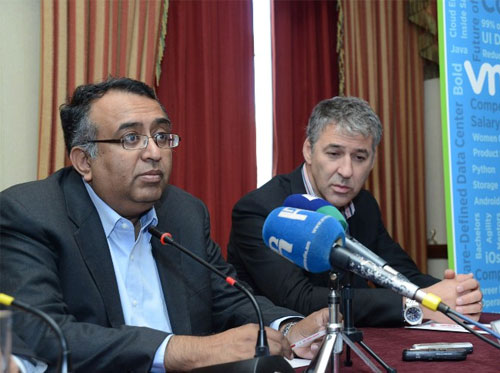-

Photolure
14:30 | 12.11.13 | Articles | exclusive 14310
VMware: We are going to invest $100 million in Armenia during next 4-5 years
VMware, Inc. is an American software company that provides cloud and virtualization software and services. According to Forbes 2013 list VMware was ranked number three of the world’s most innovative companies. VMware's more than 500,000 customers and around 55,000 distribution and reseller partners worldwide including Apple, IBM, Dell, Compaq, Fujitsu, Siemens, Hitachi, HP, Cisco, Intel etc.
Raghu Raghuram, Executive Vice President of Cloud Infrastructure and Management and Adrian Tudor, Vice-President of Research and Development, Cloud Management at VMware, visited Yerevan last month and met with Prime Minister Tigran Sargsyan. They talked about the prospects of their company in Armenia in an exclusive interview wth Mediamax’s correspondent Aram Araratyan.
- During your visit you met with Armenian Prime Minister. What was the agenda of your discussions?
- Adrian Tudor: The agenda was basically around how we could develop the cooperation between the Armenian government and our company, how we can work together more closely, how we can move the obstacles and help each other. We obviously see the great opportunities here with academicians, students, schools. I was personally involved in the process of people recruiting over six years here and I am quite confident that we want to invest here and enlarge our presence.
- VMware office has been operating in Armenia since 2010 and it is the only representation in the region. By what criteria did you choose Armenia? What success has the office made over the several years?
- A.T.: Surely, before starting our activities here we made a great acquisition of an Armenian market and a team. We send some of Armenian office people to trainings and probations to Palo Alto in the U.S., to European offices. But because of the quality and caliber of the people here and the results that we obtained, the decision was made to continue and increase the investment and bolster our presence here. It is going back to the ability to deliver, the quality of the people, students, universities that help us to develop these products. We are very satisfied with Armenian team’s work. I would like to add that our team here is composed of PhDs and engineers who are in charge of the overall development of the product.
Raghu Raghuram: The business results that we are getting here give us confidence to expand. We are going to invest around $100 millions here next 4-5 years. VMware Armenian office currently employs over 60 R&D professionals and for that period of time a number of software engineers working here will double.
- What is the virtualization level in Armenia against the background of global trends in your opinion? How do you assess the development rates?
- R.R. Virtualization rates in this region are fairly low as compared to the rest of the world where some countries are very advanced - nearly 70-80% virtualized and more. But there are also a lot of countries in Eastern Europe, Latin America, Asia that just getting started in virtualization. We classify Armenia in that stage - the beginning stage. But I would like to stress that products, developed here, are used by hundreds of thousands of customers over the world.
- How can the difference in virtualization between Western and Armenian market be reduced?
- R.R. There are multiple factors. One factor is, of course, that market is becoming more aware and more educated about the benefits of virtualization and cloud technologies. As we invest more in Armenia we expect that awareness to increase. The second factor is creating very successful examples here in governmental as well as non-governmental sectors. Local IT sector here gets a confidence that this is a technology that could work for them successfully. These are exactly the trends that we have seen in other regions and other countries and we expect the similar will happen here.
- Obviously, the so-called Cloud Infrastructure and virtualization give companies more benefits - particularly reduction of expenses, enhancement of business flexibility etc. Do you see any obstacles which would hinder the development of “clouds” and virtualization in Armenia?
- A.T. I don’t think I see any obstacles. Here are the factors of hard technologies and opportunities – savings, operating expense, efficiency, effectiveness, application infrastructure services, etc. These are very large and very visible technologies. We have a case and over-case studies about the benefits of these technologies. If you look at some of the large cloud companies you notice a tremendous adoption. So “cloud” is here to stay, to grow and we see great revenue from a perspective of customer adoption. We don’t really see any blocks in this point.
- Only a few companies in Armenia are able to introduce virtualization and clouds technologies now. They counter-evidence this by the fact that only major companies can afford such solutions as the management of such an environment is rather a complicated process requiring vast administrative and managerial resources. How would you respond to the skeptics?
- R.R. If you look at our worldwide customer base, you could notice that we have 500 000 customers, including both world’s largest and strongest companies and companies that have just several people. Our technology actually makes the life easier, for example, a small shop is able to use the applications and just do less work. So the technologies are very relevant even for the small companies and that is we proved in many other places in the world.
- What objectives does the Armenian VMware office currently face now? And which segments of virtualization market in Armenia have the fastest growth rates in your opinion?
- R.R. The objective primarily is to build software products, the product lines for the global market. There are 2-3 products that we are building here. The team is taking a lead in developing these products. And they have measured on making that product in line of customers needs and making it on very high quality and performance and delivering on time.
- What new areas will VMware develop in future?
- R.R. The age of the “cloud” is just starting. We expect to do much more in terms of cloud technologies area both building the software, telecom operators and others to offer cloud services, as well as operating our own cloud services. Another area is a mobile computing that helps enterprise customers, manage the challenges of mobile computing. Those are the areas we are focusing now.

17:29 | 24.09.25 | Articles
Jacopo Losso on Cross-Border Investments and Why Armenia Attracts Angels








